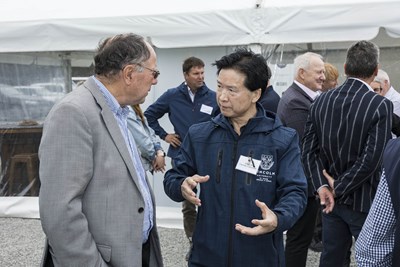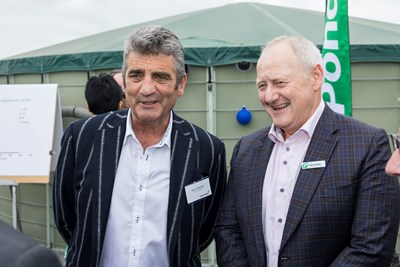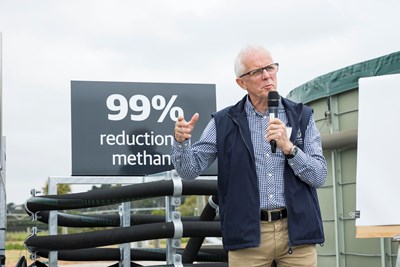Thursday, 11 November 2021
EcoPond showcase introduces practical methane mitigation
Agsector leaders enjoyed the showcase of new methane-mitigating technology at Lincoln University Research Dairy Farm yesterday.
As Minister for Climate Change James Shaw was addressing the COP Climate Change Summit in Glasgow, Minister for Agriculture Damien O’Connor was congratulating Lincoln University and farm nutrient co-operative Ravensdown for their latest technology that could cut total farm methane emissions by about 5%.
MPs Gerry Brownlee and Nicola Grigg joined other attendees who learned more about the EcoPond system that virtually eliminates the methane emanating from a dairy farm’s effluent pond.
In greeting the attendees, Damien O’Connor said, “The development of EcoPond by Ravensdown and Lincoln University provides farmers with another lever they can use and helps our primary industries tackle emissions in the critical area of biogenic methane. Markets are asking for change and it’s great to see companies – in this case, a co-operative – responding through collaboration with a university and applying technology in new ways.”
Ravensdown Chair, John Henderson said, “our co-operative’s R&D spend has increased year by year and must continue in that direction if we are to help our farmer owners continue to improve their environmental performance. While EcoPond is our latest release, we have several other initiatives in the pipeline with Lincoln.”
“It is a simple, practical solution backed by science and one that every dairy farmer can understand and operate. It brings multiple benefits, not only in reduced methane emissions but also in increased nutrient capture and utilisation.
Lincoln University Chancellor Bruce Gemmell added, “this new technology promises immediate benefits for the dairy farming sector in mitigating methane while gaining water quality benefits at the same time.”
Mike Manning General Manager Innovation and Strategy introduced the technology and thanked the teams involved. “To their credit, our farmer owners are saying ‘we need solutions to the long-term issues that are facing our sector’ and this kind of technology helps to demonstrate New Zealand’s leadership on the world stage.”
LU Emeritus Professor Keith Cameron explained how the system mimicked a natural process observed in coastal wetlands that emit less methane than would be expected. “This is because the sulphate in the seawater means the methanogens that produce methane are outcompeted for their food source. The EcoPond system does the same thing in dairy effluent ponds with the end result being a 99% reduction in the amount of methane emitted.”
LU Professor Hong Di concluded, “we almost discovered this by accident because we were looking at how to recycle the water in dairy effluent when we saw that an additive used in the treatment of drinking water had such as dramatic effect on methane.”



